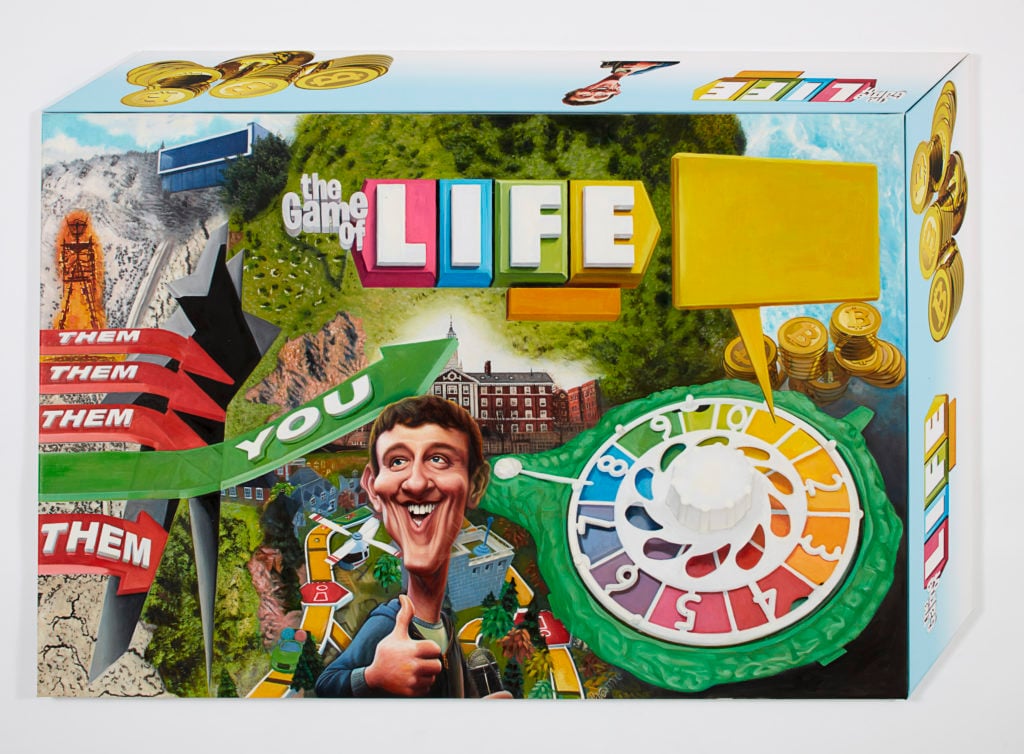Art World
How Artist Simon Denny Is Turning Board Games Into Hilarious Critiques of Digital Capitalism
The artist remixes games like Settlers of Catan—with a subversive twist.

The artist remixes games like Settlers of Catan—with a subversive twist.

Tim Schneider

If you’ve ever thought about how a Monopoly victory means ruthlessly bankrupting your family and friends, then you know it’s possible for board games to have philosophical implications. But they’re rarely created for that express purpose—unless cross-disciplinary artist Simon Denny is the one behind the controls. And nothing makes the radical potential of board games clearer than “The Founder’s Paradox,” Denny’s exhibition now on view at the Museum of Contemporary Art Cleveland through June 10.
The show takes its name from a concept addressed in billionaire libertarian Peter Thiel’s book Zero to One: Notes on Startups, or How to Build the Future. In it, Thiel and co-author Blake Masters muse about the razor’s edge that tech entrepreneurs must tiptoe to reach success and maintain sanity in the Silicon Valley gauntlet. They write, “The single greatest danger of a founder is to become so certain of their own myth that they lose their mind. But an equally insidious danger for every business is to lose all sense of myth and mistake disenchantment for wisdom.”
Denny’s show isn’t just about dissecting the nuances of this dilemma, though. It’s about interrogating the broader philosophies driving some of the world’s most prominent founders—and, given the increasing influence their products play in shaping our lives, the real-life implications for the rest of us. “I hope one of the things that comes through in this show,” Denny told artnet News, “is some of the problematic underpinnings of how digital capitalism is expanding in a kind of neocolonial way.”

Detail of Simon Denny’s Founders Board Game Display Prototype (2017). Courtesy of the artist and Michael Lett, Auckland.
Rather than try to tackle these weighty issues with grim or self-serious art, Denny chose the opposite strategy. “The Founder’s Paradox” consists of sculptures, paintings, and prints all originating in three newly conceived board games, each of which mischievously retools an existing game using the philosophical values of startup culture.
The first game, Founders, reinterprets Settlers of Catan, “which is obviously a board game with colonial overtones to say the very least,” Denny said. To win, players must advance from their starting environment, Decaying Earth, to New Zealand, followed by the man-made island of a Pacific seasteading structure (“like the one potentially being built in Tahiti right now,” Denny clarified), and finally to Space Colonies on the moon and Mars.
Then comes Ascent: Above the Nation State, adapted from Descent: Journeys in the Dark. Here, the player chooses a Contrarian Hero—each modeled on an actual founder, including an armor-clad, bow-and-shield-wielding Thiel clone—to face off against Maladaptive Monsters like the dragon “Democracy,” a mace-swinging giant known as “Monetary Policy,” and a lion-like creature called “Fair Elections.” Their quest? To reach the global cloud, “where every individual is free and equal.”
The trio rounds out with a philosphical update of the classic Game of Life, renamed Game of Life: Collective vs Individual. Like the original, Denny’s version asks players to make soul-searching decisions about their values at every major turning point on the board. The twist is that here the options all force a choice between socially conscious collectivism and self-centered, profit-driven libertarianism. For example, do you pay $100,000 in taxes en route to humbly re-enrolling in Stanford or move outside any taxable jurisdiction on your way to establishing a “cyber-monopoly”?
While Denny hesitates to describe his work as “educational”—he worries the word “sounds too paternal”—communicating the thorny ideas embedded in Silicon Valley culture remains key to his practice. “There’s certainly a sense of making things legible to communities that aren’t spending their time looking at the things that I am,” he said. As a result, “a visit to one of my exhibitions is halfway between a science museum or a history museum and an art gallery.”

Detail of Simon Denny’s Ascent – Above the Nation State Board Game Display Prototype (2017). Courtesy of Michael Lett, Auckland.
“The Founder’s Paradox” is not Denny’s maiden voyage with the vocabulary of board games. Some of the works at MOCA Cleveland were previously presented in an exhibition of the same name at Michael Lett Gallery in the artist’s native New Zealand. He also used the whimsical source material as a launch point for his 2017 project at the Hammer Museum, as well as his 2016 solo exhibition at Petzel Gallery. “I frame my exhibits as games to add a layer of remove,” he said. Presented in this alternate visual context, the very real concepts can instead be “posited as some kind of weird fantasy”—one that may actually help viewers better evaluate the legitimacy or absurdity of the underlying phenomena.
And make no mistake, thinking through founder culture means entering a labyrinth, even for Denny. He admits that his work is where he tries to unpack the concepts and shore up his own position on the issues. When it comes to the philosophies and insights of the tech world, “It’s difficult to find a place to stand,” he said. “To take the language of the founder and put it on display” at least gives him the opportunity to evaluate it fairly.
Still, Denny understands that the stakes in this debate are higher than ever before. When asked about a previous interview in which he described his work as “fan art” about tech culture, he revealed that those comments were essentially part of a performance. He explains that he has “tried on various different hats and poses” in relation to tech culture, with each one reflecting the public’s sentiment toward Silicon Valley at a given time. “When I was making that work in the mode of a fan, those [skeptical] narratives weren’t present in the media,” he said. When he made his first piece about the tech community, in 2013, the conversation centered around “this kind of emancipatory capacity of social media, as manifested in the Arab Spring.”
Years later, though, with online platforms being discussed as weapons of mass disinformation and vampires leeching our privacy for ad dollars, the narrative has shifted. “Now we get this completely opposite arc,” Denny said. In “late web 2.0” there are these “giant platforms like Facebook where value is extracted from people’s everyday emotional musings or whatever, but there’s this loss of… editing/curatorial force that we had in the centralized media. We’ve got this not-so-great mix.”
The question is which direction key founders will choose—and how many of us will follow them. “There has not been another system besides authoritarianism and capitalism,” Denny said about the world’s governance principles, “so it’s great when you hear people say there’s some way it can be done [better] instead of just being depressed about it.”
At the same time, “If you get into the space of questioning all this stuff, and then you’re given this other answer—the right-wing one—immediately, you can conflate the two and potentially create something that’s even worse.”